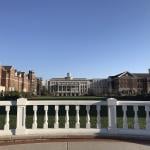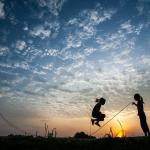Washington D.C., Dec 28, 2016 / 04:02 am (CNA/EWTN News).- A reputed “Catholic Spring” surfaced in the news this fall, after hacked emails from John Podesta, Hillary Clinton’s campaign manager, indicated plans for an effort to sow revolution within the Church. But grants to the think tank Podesta founded also suggest links to other efforts targeting religion. The Center for American Progress appears to be part of an influence network that advocates restrictions on religious freedom while promoting dissent within Christianity on sexual morality, especially LGBT issues. Podesta co-founded the Center for American Progress in 2003 after serving as White House Chief of Staff in President Bill Clinton’s final term. He served as the center’s CEO until 2011. He became a special adviser to President Barack Obama in 2013, and joined the Hillary Clinton campaign in early 2015. Two six-figure grants to the think tank from the Arcus Foundation seem to place it within a multi-million dollar campaign targeting religious freedom protections that conflict with LGBT political issues and the provision of abortion and contraception. The Arcus Foundation in 2013 gave $400,000 to the Center for American Progress’ Faith and Progressive Policy Initiative in order to “articulate and disseminate a socially progressive framework of religious liberty.” A $250,000 Arcus grant in 2016 backed the center’s Reclaiming Religious Liberty as a Progressive Value Project “to promote religious liberty as a core progressive American value that includes LGBT equality and women's reproductive health and rights,” grant listings on the foundation website say. On the Center for American Progress website, the Faith and Progressive Policy Initiative described religious liberty as “a core American value.” But it added caveats. “Unfortunately, many opponents of marriage equality and women’s reproductive health claim that religious liberty allows them to opt out of laws to which they object,” it said. “We work to raise the voices of faith-based leaders and advocates to promote an inclusive vision of religious liberty – one that supports human and civil rights and does not use religious liberty to discriminate or coerce others to abide by beliefs not their own.” The initiative opposes “policies with overly broad religious exemptions that cause harm to others” and supports policies it said “promote religious liberty for all, rather than a favored few.” The Arcus Foundation describes its strategy for “fair and non-discriminatory religious exemption policies” on its website in a section labeled social justice. It is among several wealthy funders backing various groups to oppose religious freedom exemptions. These groups include the ACLU, a project at Columbia Law School, Planned Parenthood, the Movement Advancement Project, and Podesta’s Center for American Progress. The Arcus Foundation also pursues a strategy of cultivating allies among religious groups. It provided financial support for Center for American Progress senior fellow V. Gene Robinson, whose controversial election as the Episcopalian Bishop of New Hampshire in 2003 helped split the Episcopal Church and the global Anglican Communion. In 2011 and again in 2012, the Arcus Foundation provided $30,000 to Podesta’s think tank in order to “amplify on a national level the voice and impact of the progressive social justice advocacy of Bishop Gene Robinson, the first openly gay Episcopal bishop,” the foundation’s tax forms show. Robinson is currently listed as an expert in the Center for American Progress’ Religion and Values section. Podesta is now listed as a member of the board of directors of the Center for American Progress, alongside names like Secretary of State Madeline Albright, former U.S. Sen. Tom Daschle, and billionaire hedge fund manager Tom Steyer. A February 2012 email exchange involving Podesta concerned the religious freedom controversy over a new federal rule that required employers to cover sterilizations and contraceptives, including abortifacient drugs, even if doing so would violate their religious beliefs. Podesta’s interlocutor, progressive leader Sandy Newman, noted Catholic bishops’ outspokenness and discussed the possibilities of a “Catholic Spring,” similar to Arab protests, to lead Catholics to demand “the end of a middle ages dictatorship and the beginning of a little democracy and respect for gender equality in the Catholic church.” Newman wondered how one would plant “the seeds of revolution.” Podesta responded that he and his allies had created Catholics United and Catholics in Alliance for the Common Good for a moment like the one Newman saw. At the same time, Podesta suggested the groups lacked the leadership to do so. He suggested consulting with former Maryland Lt. Gov. Kathleen Kennedy Townsend. The Center for American Progress and the Catholics United Education Fund are among the many partners the Arcus Foundation lists on its website. Among its other grantees are Catholics for Choice and Dignity USA, a group that rejects Catholic teaching on homosexuality. The Arcus Foundation helped fund Dignity USA and its aligned Equally Blessed Coalition “to influence and counter the narrative of the Catholic Church and its ultra-conservative affiliates” ahead of the Synod on the Family. The foundation also funded a project through the European Forum of LGBT Christian Groups to counter the influence of African bishops at the synod by documenting and circulating the stories of people from their countries who identify as LGBT. That project was funded in collaboration with the Swiss bishops’ development charity Fastenopfer, known as the Swiss Catholic Lenten Fund. The Arcus Foundation was founded by billionaire heir Jon Stryker, a major Clinton donor. Its executive director is Kevin Jennings, a former Obama administration Department of Education official. The foundation is a prominent partner of the U.S. State Department’s Global Equality Fund, which promotes LGBT advocacy worldwide. CNA contacted the Arcus Foundation and the Center for American Progress for comment but did not receive a response by deadline. This article was originally published on CNA Oct. 27, 2016. Read more















